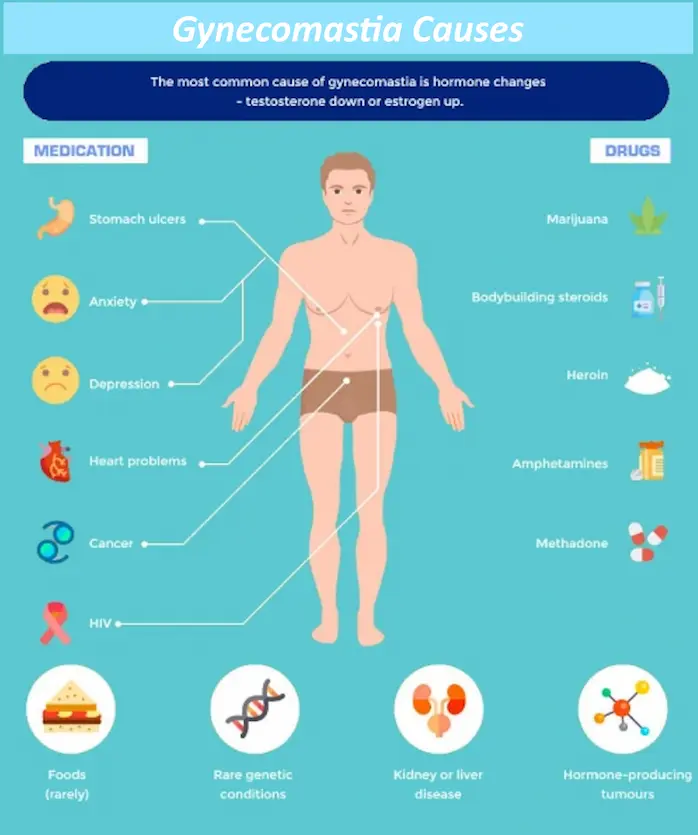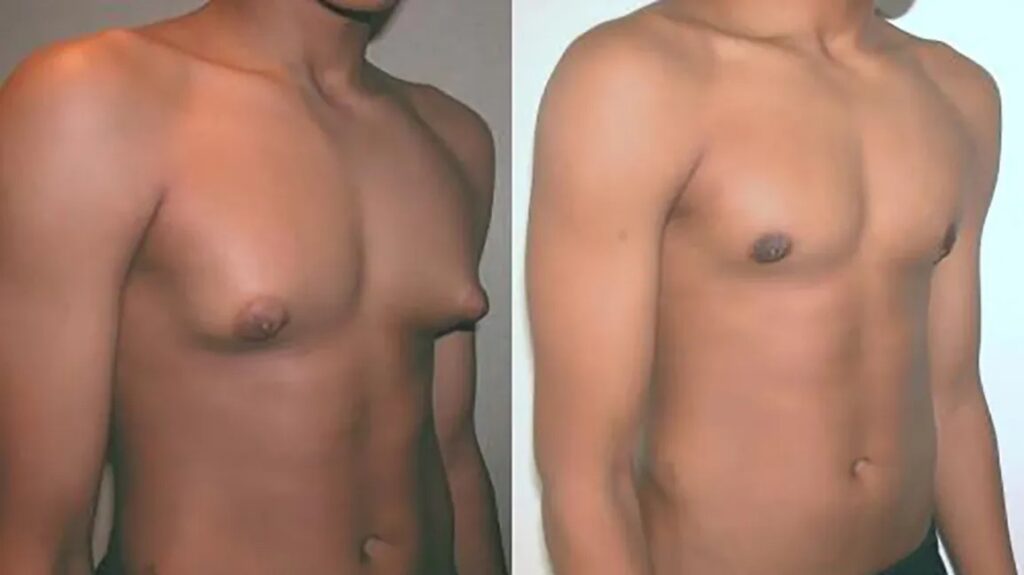
Gynecomastia is a condition that can affect men at any stage of life, from adolescence to older age, caused by a variety of factors, including medical conditions, medications, substance use such as anabolic steroids, aging, and several others. However, hormonal imbalance due to fluctuations in testosterone and estrogen levels is the main reason a man develops abnormal growth of dense breast tissue which may be mixed with fat, creating an enlarged chest appearance. This firm tissue is resistant to traditional diet and exercise methods of weightloss, making it challenging for those affected to achieve the masculine chest contour they desire. The abnormal growth of breast tissue can alter the natural shape of a man’s chest, leading to feminine changes in appearance that many find undesirable and distressing. In more severe cases, the excess breast tissue may become significant enough to cause protrusion and sagging skin, further contributing to the feminized chest contour.
At the Boston Gynecomastia Specialists, we are here to provide you information and the best options to treat your specific condition. Schedule a personalized consultation today to meet with our doctor.
What Causes Gynecomastia?
Gynecomastia, or an abnormal enlargement in breast tissue in men, can have many causes, There are a variety of medications and medical conditions that can lead to Gynecomastia, but they are alike in that they cause an imbalance between the hormones estrogen and androgen. This imbalance can be confirmed through diagnostic testing, but this is typically not required. Changes in hormones are normal throughout one’s lifetime, but a significant disruption can cause more substantial effects. The imbalance can be the result of physiological changes due to:
- Puberty: In preteen boys, breast buds are common during puberty. The buds may last up to 2 years, but they tend to go away within the first year. Gynecomastia can also be caused by an estrogen-producing tumor. In teen boys, gynecomastia is caused by the hormonal changes of puberty. Gynecomastia occurs in many boys during early puberty to middle puberty. It usually goes away within 6 months to 2 years.
- Aging: commonly more than 65% of me over the age of 50 develop gynecomastia due to changes in hormone levels.
- Weight loss or gain / obesity
- Declining testosterone production / hypogonadism
- Liver disease
- Kidney failure
- Thyroid disease
- Tumors (cancerous or non-cancerous)
- Chromosomal abnormalities (like Klinefelter syndrome)
- Genetic / Familial
- Metabolic dysfunction
- Alcohol consumption
- Other conditions such as ulcerative colitis, cystic fibrosis, and testicular injury.
- Medications (like some used for the treatment of HIV, cancer, heartburn, and fungal infections)
- Anti-androgens: Used to treat prostate cancer and enlarged prostate, such as flutamide, finasteride, and spironolactone (Aldactone), Risperdal
- Anabolic steroids: Used to treat muscle loss or delayed puberty, often the cause of gynecomastia in bodybuilders
- HIV medicines: Some HIV medicines have estrogen-like properties that can cause gynecomastia, especially efavirenz
- ADHD medicines: Amphetamine-containing ADHD medicines, such as Adderall
- Anti-anxiety medications: Diazepam (Valium) and other anti-anxiety and antidepressant medications such as Prozac, Zoloft and Amitryptyline
- Tricyclic antidepressants
- Some antibiotics / antifungals (Ketoconazole)
- Opioids: Morphine, heroin, and marijuana
- Ulcer medicines: Cimetidine (Tagamet HB) and omeprazole (Prilosec)
- Chemotherapy: Chemotherapy drugs used to treat prostate cancer, like Casodex) and flutamide and other alkylating agents.
- Heart medicines: Digoxin (Lanoxin) and calcium channel blockers
- Stomach-emptying medicines: Metoclopramide
- Other drugs that may cause gynecomastia include: Ketoconazole, Bicalutamide, Cyproterone, Dutasteride, Goserelin, Leuprorelin, Oestrogens, Nifedipine, and Verapamil
- Supplements and herbal products (especially some derived from tea tree oils and lavender)
In most cases, the cause of gynecomastia is unknown or idiopathic; However, diagnosis of any underlying medical condition is important in order to treat more serious health issues and ensure overall quality of life. Despite diligent diagnostic investigation and attempt at medical treatment, any any potential medical condition or medication thought to cause gynaecomastia, it may persist.
Which Medications have been used to treat gynecomastia?
Medications that have been used to treat gynecomastia are usually used off-label, which means that they have not been approved by the FDA for this use. If you want or need treatment, your healthcare provider can walk you through your options. These include:
- Dopamine agonists: These include medications like bromocriptine (Parlodel) and cabergoline, which may help manage high prolactin levels.
- Selective estrogen receptor modulators (SERMs): Tamoxifen, one type of SERM, helps lower the amount of estrogen in the breast tissue. So it can also help treat gynecomastia. Raloxifene (Evista) may also be an option.
- Androgens: DHT may help treat symptoms caused by little-to-no testosterone in your body. However, there’s not a lot of supporting evidence for their use.
Aside from medications, the most effective and definitive way to removal gynecomastia permanently is through surgery. But whether surgery, like medication, is an option will depend on your situation. Talk to your primary care provider and Dr. Ishoo for more personalized advice.
Contact a Boston Gynecomastia Surgeon
Individuals from Boston or the greater New England are invited to schedule an appointment at the Boston Gynecomastia Specialists and we can help you achieve your ideal results.
Our caring and experienced team is here to provide personalized care and the best treatment tailored to your pernal needs and specific gynecomastia condition. Schedule your personalized consultation with our Boston gynecomastia surgeon and take the first step towards addressing your gynecomastia.
_____________________________________________________________
The Boston Gynecomastia Specialists is the premier Greater Boston Gynecomastia Center of Excellence. Our primary focus is on providing outstanding care throughout every step of your journey, from the first consultation to your full recovery. We recognize and appreciate the confidence you have in us and are unwavering in our commitment to maintaining the utmost level of patient care. Led by Dr. Edwin Ishoo, a highly skilled, board-certified surgeon with expertise and over 30 years’ experience in Male Breast Reduction, our dedicated team is fully committed to ensuring the best possible surgical outcomes tailored for each individual. Recognizing that every man is unique, we personalize our approach to meet your specific condition, needs and expectations. We welcome you to take that first step to achieving the transformation you have been imagining and contact the Boston Gynecomastia Specialists, the leading Gynecomastia Center in Boston, to meet with Dr. Ishoo for your personalized, in-person consultation and have your questions answered. Let us take the gynecomastia concern off your chest in a day and off your mind forever!


